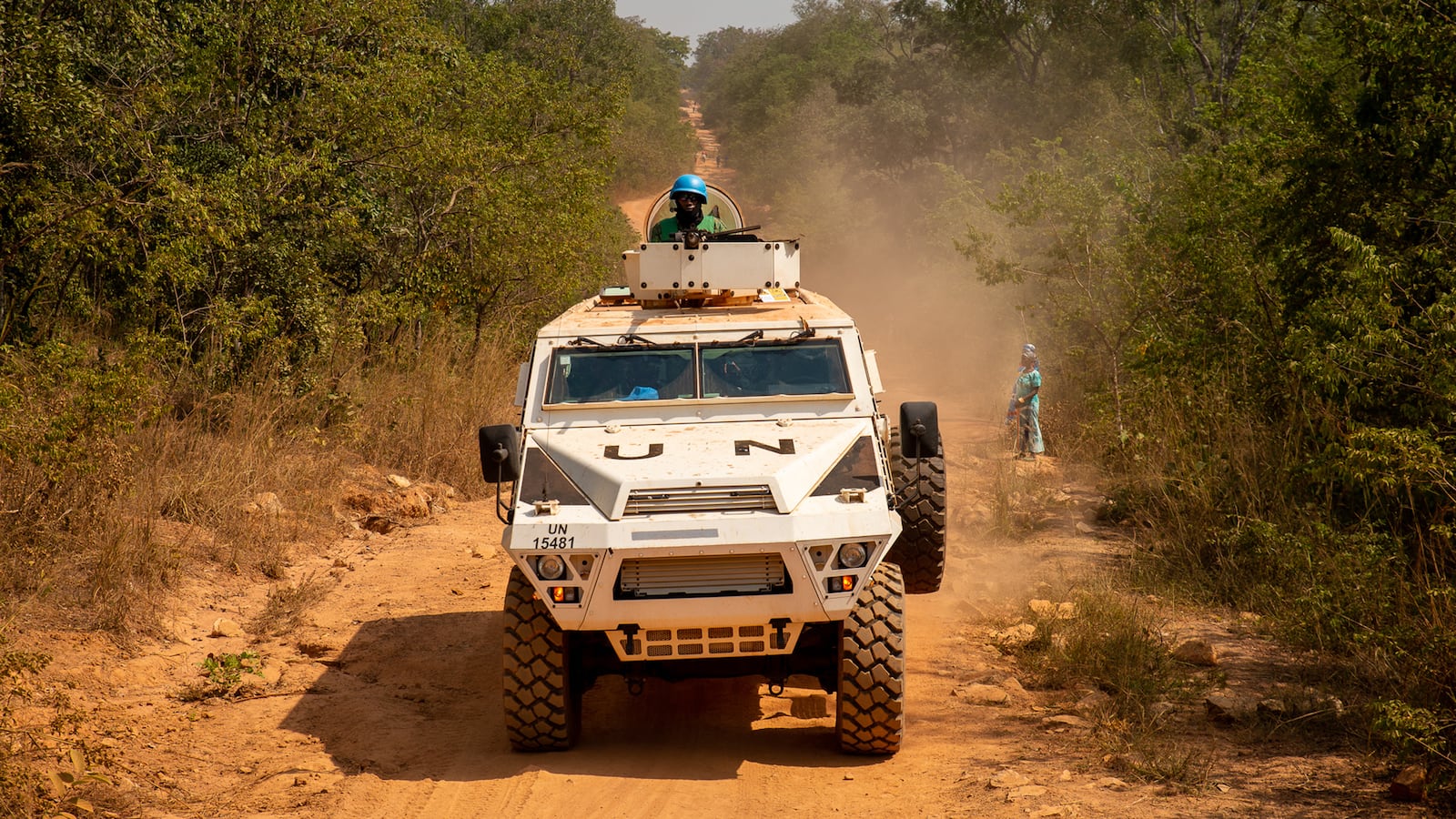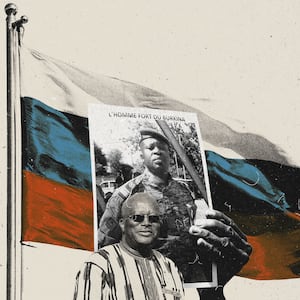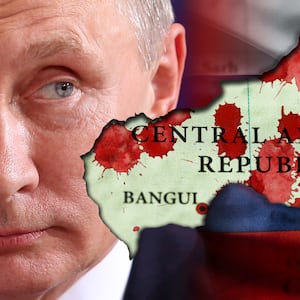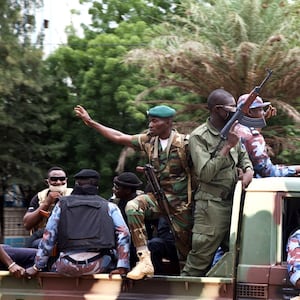ABUJA, Nigeria—Prince Ngoma was just about to depart a mining site in Central African Republic’s (CAR) eastern village of Aïgbado when heavily armed Russian mercenaries in a pickup truck drove in, opened fire, and burned down the houses in the area.
“They didn’t speak a word to anyone, only their guns did the talking,” said Ngoma, who was only there to meet a friend. “I saw people screaming and falling on the ground. It was only by luck that I survived.”
For about 20 minutes at around noon on Jan. 16, Ngoma said, the Russians opened fire repeatedly before fighters from the Union for Peace (UPC) rebel group, which the mercenaries have constantly targeted, showed up and began to fire back, wounding about four fighters and causing the Russians to retreat.
“We counted eight bodies after the Russians had left,” he told The Daily Beast. “These were civilians killed at the spot during the shooting.”
But the Russians weren’t satisfied. As hundreds of frightened villagers ran to the nearby Yanga community (located 40 miles from Aïgbado), the Russian mercenaries, this time accompanied by CAR government forces commonly referred to as FACA, chased them there and slaughtered as many people as they could.
“The killings went on for two days.” Abdoulaye Ishmael, a farmer in Yanga, told The Daily Beast. “Since the incident happened, we've counted up to 70 dead bodies.”
The United Nations, through its spokesman Stéphane Dujarric, said it has received reports of the incident involving CAR troops and “other security personnel” and is “currently confirming the number of casualties and displacement.” The human rights team in the country known as MINUSCA has been dispatched to the area—and they may be shocked by what they find.
Locals say there are corpses littered in the forest between Aïgbado and Yanga, while fishermen at the Kotto River that passes through Yanga have retrieved 14 dead bodies, including women and children, according to local reports.
“Everyday, we keep seeing new dead bodies,” said Ishmael. “The number of people killed by the Russians could be much more than what we’ve seen or heard so far.”
Reports of Russian aggression in CAR have become commonplace. Since the 2018 killings of three Russian journalists who were investigating the local activities of Wagner Group, a mercenary outfit linked to Russia President Vladimir Putin’s close associate Yevgeny Prigozhin, hostility towards locals in the impoverished Central African nation has been on the rise.
In December 2020, Wagner mercenaries fired on a truck for failing to stop at a checkpoint in the town of Bambari, injuring the driver and killing three passengers, according to a CNN report. Two months later, Russians opened fire at a mosque in Bambari, killing about 21 people, including children and the elderly, before burning down homes nearby. Last March, it was also reported that the Russians shot and killed a local chief, whom they had accused of having a soft spot for the rebels near the town of Bambari. A month after, Wagner mercenaries kidnapped four community leaders from Bria and, as The Daily Beast previously reported, flew them to an undisclosed location before storming Koui to seize the sultan of the northwestern town, along with his bodyguard and assistant. They announced much later that the three men had been killed in a landmine explosion not far from the sultan’s house.
The latest spate of atrocities which began in mid-January may still be unfolding. Sources told The Daily Beast that the Russians have blocked access to Aïgbado and Yanga and restricted movements in and out of the communities. The local media is reporting that the mercenaries have set up an outpost in Aïgbado and anyone who tries to leave the village is shot at. Residents say everyone is living in fear.
“Everyone in Aïgbado is scared of walking on the streets because anything can happen to you if you come face to face with the Russians and FACA,” said Ngoma. “There are a number of villagers missing since January 16, and we suspect they've been killed or abducted by Russian mercenaries and FACA.”
Since December 2017, when Russia secured an exemption to the UN arms embargo, allowing Moscow to deliver arms and training for CAR forces, Wagner mercenaries have appeared all over the restive African nation, often guarding lucrative gold and diamond mines. Wagner recruits many of its mercenaries from the Russian military intelligence agency known as the GRU. Prigozhin—often called “Putin’s chef” because of the huge contracts handed out to his catering company—is the mastermind behind both Wagner and Russia’s involvement in CAR and Africa; it is unknown how closely he consults with his comrades in the Kremlin
Prigozhin’s private military has also been linked to recent coups in Mali and Burkina Faso, both of which also have major gold mines.
Regarded as one of the world’s poorest nations, the CAR descended into civil war in 2013. A mainly Muslim rebel coalition called Séléka took control of the capital Bangui, overthrew the government, and began plundering villages. They also targeted Christians and supporters of the former president. In response, Christian vigilantes began a bloody program of ethnic cleansing against the Muslim minority, causing the UN to impose an arms embargo and create a peacekeeping mission.
Muslim rebels and Christian militants still control much of the country and continue to fight each other to take control of territory and mineral resources. A helpless Faustin-Archange Touadéra, who was sworn in as president in 2016, turned to Russia for security assistance months after taking office and Moscow accepted but with an agreement to allow Russia to explore CAR’s natural resources, and Wagner mercenaries are doing so with brutality.
“What happened here in Aïgbado confirms what people have been saying, that going to a gold mine in this country is like a death sentence,” said Ngoma. “You just can’t survive in an environment where the Russians are so interested.”




